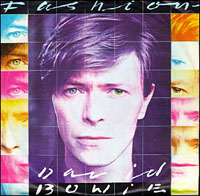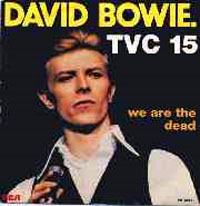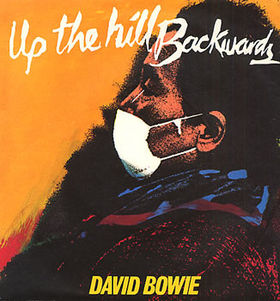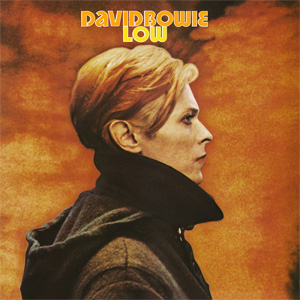Reception
NME's Roy Carr and Charles Shaar Murray considered it to have "overtones of Bowie's personal blackout in Berlin (where he collapsed and was rushed to hospital)", noting the line "Get me to the doctor" and an atmosphere of "disorientation, fragmentation, panic". [4]
According to music professor James E. Perrone, the "harrowing" song is the least accessible of the album, offering a prelude to the experimental songs of Bowie's next album, Lodger (1979). The lyrics are difficult to decipher, he writes, as a result of the reverberation Bowie and Visconti added. [5] Nicholas Pegg surmised that the line "Someone's back in town, the chips are down" may have referred to Bowie's wife, Angela Bowie, who had just arrived in Berlin around the same time. [1]
Author and essayist Chris O'Leary referred to Blackout as being "as abrasive as "Heroes" gets" and "sound[ing] like a monster". He also drew comparisons with previous songs, such as "Suffragette City" off The Rise and Fall of Ziggy Stardust and the Spiders from Mars and "Stay" off Station to Station . [6]
The cut-up lyrics of "Blackout" were one of the exhibits in the Victoria and Albert Museum exhibition David Bowie Is in 2013. [7] [8]

"Heroes" is the 12th studio album by the English musician David Bowie, released on 14 October 1977 through RCA Records. Recorded in collaboration with musician Brian Eno and producer Tony Visconti, it was the second release of his Berlin Trilogy, following Low, released in January the same year, and the only one wholly recorded in Berlin. Sessions took place in mid-1977 after Bowie completed work on Iggy Pop's second solo album Lust for Life. Much of the same personnel from Low returned for "Heroes", augmented by King Crimson guitarist Robert Fripp.

Lodger is the 13th studio album by the English musician David Bowie, released on 25 May 1979 through RCA Records. Recorded in collaboration with musician Brian Eno and producer Tony Visconti, it was the final release of his Berlin Trilogy, following Low and "Heroes". Sessions took place in Switzerland in September 1978 during a break in the Isolar II world tour, and in New York City in March 1979 at the tour's end. Most of the same personnel from prior releases returned, and future King Crimson guitarist Adrian Belew joined from the tour. The sessions saw the use of techniques inspired by Eno's Oblique Strategies cards, such as having the musicians swap instruments and play old songs backwards.
The "Alabama Song"—also known as "Moon of Alabama", "Moon over Alabama", and "Whisky Bar"—is an English version of a song written by Bertolt Brecht and translated from German by his close collaborator Elisabeth Hauptmann in 1925 and set to music by Kurt Weill for the 1927 play Little Mahagonny. It was reused for the 1930 opera Rise and Fall of the City of Mahagonny and has been recorded by the Doors and David Bowie.

"Fashion" is a song by English musician David Bowie from his 1980 album Scary Monsters . Co-produced by Bowie and Tony Visconti and recorded from February to April 1980 at New York and London, it was the last song completed for the album. Originating as a reggae parody titled "Jamaica", "Fashion" is a post-punk, dance and funk track structurally similar to Bowie's "Golden Years". King Crimson guitarist Robert Fripp contributed lead guitar.

"Holy Holy" is a song by English singer-songwriter David Bowie, originally released as a single in January 1971. It was recorded in November 1970, after the completion of The Man Who Sold the World, in the perceived absence of a clear single from that album. Like Bowie's two previous singles, it sold poorly and failed to chart.

"TVC 15" is a song by English musician David Bowie, released on his 1976 album Station to Station. RCA Records later released it as the second single from the album on 30 April 1976. The song was recorded in late 1975 at Cherokee Studios in Los Angeles. Co-produced by Bowie and Harry Maslin, the recording featured guitarists Carlos Alomar and Earl Slick, bassist George Murray, drummer Dennis Davis, pianist Roy Bittan and Warren Peace on backing vocals. The upbeat song is mostly art rock performed in a style reminiscent of the 1950s. Lyrically, the song concerns a character's girlfriend being eaten by a television set. It was inspired by a dream of Iggy Pop's and Bowie's role in The Man Who Fell to Earth (1976). Some lyrics are also influenced by the Yardbirds and Kraftwerk.

"Beauty and the Beast" is a song by David Bowie, the first track on his 1977 album "Heroes". It was issued as the second single from the album in January 1978, becoming a minor UK hit, peaking at No. 39 on the UK Singles Chart.

"Scary Monsters (and Super Creeps)" is a song by English singer-songwriter David Bowie, released as the title track of his 1980 album Scary Monsters (and Super Creeps). It was also issued as the third single from that album in January 1981. Coming as it did in the wake of two earlier singles from Scary Monsters, "Ashes to Ashes" in August 1980 and "Fashion" in October the same year, NME critics Roy Carr and Charles Shaar Murray labelled its release another instance "in the fine old tradition of milking albums for as much as they could possibly be worth". The song was subsequently performed on a number of Bowie tours.

"Up the Hill Backwards" is a song by English musician David Bowie, released on his 1980 album Scary Monsters . It was later issued by RCA Records as the fourth and final single from the album in March 1981. Originally written under the title "Cameras in Brooklyn", the song was recorded between February and April 1980 at the Power Station in New York City and Good Earth Studios in London. The recording features backing vocalists, guitar contributions from Robert Fripp and acoustic guitar played by co-producer Tony Visconti. Lyrically, the song concerns the struggles of facing a crisis, partially influenced by Bowie's divorce from his wife Angie. Musically, the song contains numerous time signature changes and a Bo Diddley-inspired beat.

The Berlin Trilogy consists of three studio albums by English musician David Bowie: Low, "Heroes" and Lodger (1979). Bowie recorded the albums in collaboration with English musician Brian Eno and American producer Tony Visconti. The trilogy originated following Bowie's move from Los Angeles to Europe with American singer Iggy Pop to rid themselves of worsening drug addiction. Influences included the German krautrock scene and the recent ambient releases of Eno.
"Fascination" is a song written by English singer-songwriter David Bowie and American musician Luther Vandross for Bowie's Young Americans album in 1975. The song originated from a Vandross song called "Funky Music " which The Mike Garson Band used to play before Bowie concerts in 1974.

"Stay" is a song by English musician David Bowie, released on his 1976 album Station to Station. The song was recorded in late 1975 at Cherokee Studios in Los Angeles. Co-produced by Bowie and Harry Maslin, the recording featured guitarists Carlos Alomar and Earl Slick, bassist George Murray, drummer Dennis Davis, pianist Roy Bittan and Warren Peace on percussion. The track features prominent dual guitar work from Slick and Alomar, who mostly composed it in the studio. Based on the chord structure of "John, I'm Only Dancing (Again)", a funk reworking of "John, I'm Only Dancing" (1972), "Stay" emulates funk rock, soul and hard rock. Lyrically, the song is about a character who begs his lover to stay, fearing she will leave him for the last time.
"Sons of the Silent Age" is a song written by David Bowie in 1977 for the album "Heroes". According to Brian Eno, it was the only song on the album composed prior to the recording sessions, all others being improvised in the Hansa by the Wall studio. Bowie himself indicated that Sons of the Silent Age could at one stage have been the title for the album, rather than "Heroes".
"V-2 Schneider" is a largely instrumental song written by David Bowie in 1977 for the album "Heroes". It was a tribute to Florian Schneider, co-founder of the band Kraftwerk, whom Bowie acknowledged as a significant influence at the time. The title also referenced the V-2 rocket, the first ballistic missile, which had been developed for the German Army during World War II, and whose design played a key role in the American space program.
"Sense of Doubt" is an instrumental piece written by David Bowie in 1977 for the album "Heroes". It was the first of three instrumentals on Side Two of the original vinyl album that segued into one another, preceding "Moss Garden" and "Neuköln".

"Look Back in Anger" is a song written by English artists David Bowie and Brian Eno for the album Lodger (1979). It concerns "a tatty 'Angel of Death'", and features a guitar solo by Carlos Alomar.
"It's No Game" is a song written by English musician David Bowie for his 1980 album Scary Monsters , featuring lead guitar played by Robert Fripp. The song is split into two parts, opening and closing the album. "(No. 1)" is musically sinister, featuring Bowie screaming lyrics and Japanese narration provided by actress Michi Hirota. "(No. 2)", a stark contrast to "(No. 1)", is much calmer, which Bowie's biographers symbolise as Bowie facing the same situation in "(No. 1)", but after the album's duration.
"Teenage Wildlife" is a song written by David Bowie in 1980 for the album Scary Monsters . Running at almost seven minutes, the song was the longest track on Scary Monsters, and Bowie's longest composition since "Station to Station" (1976), although it was surpassed in length by later tracks such as 2003's "Bring Me the Disco King" and 2016's "Blackstar".
"Scream Like a Baby" is a song written by David Bowie. It appears on the 1980 album Scary Monsters .

"Crystal Japan" is an instrumental piece written by David Bowie and released as a single in Japan in spring 1980. It was recorded during the Scary Monsters sessions that year. The instrumental was used in a Japanese commercial for the shochu Crystal Jun Rock, which also featured an appearance by Bowie, although he said at the time that the track was not specifically written for this purpose. Originally titled "Fuji Moto San", it was apparently intended to close the Scary Monsters album until replaced by "It's No Game ".











